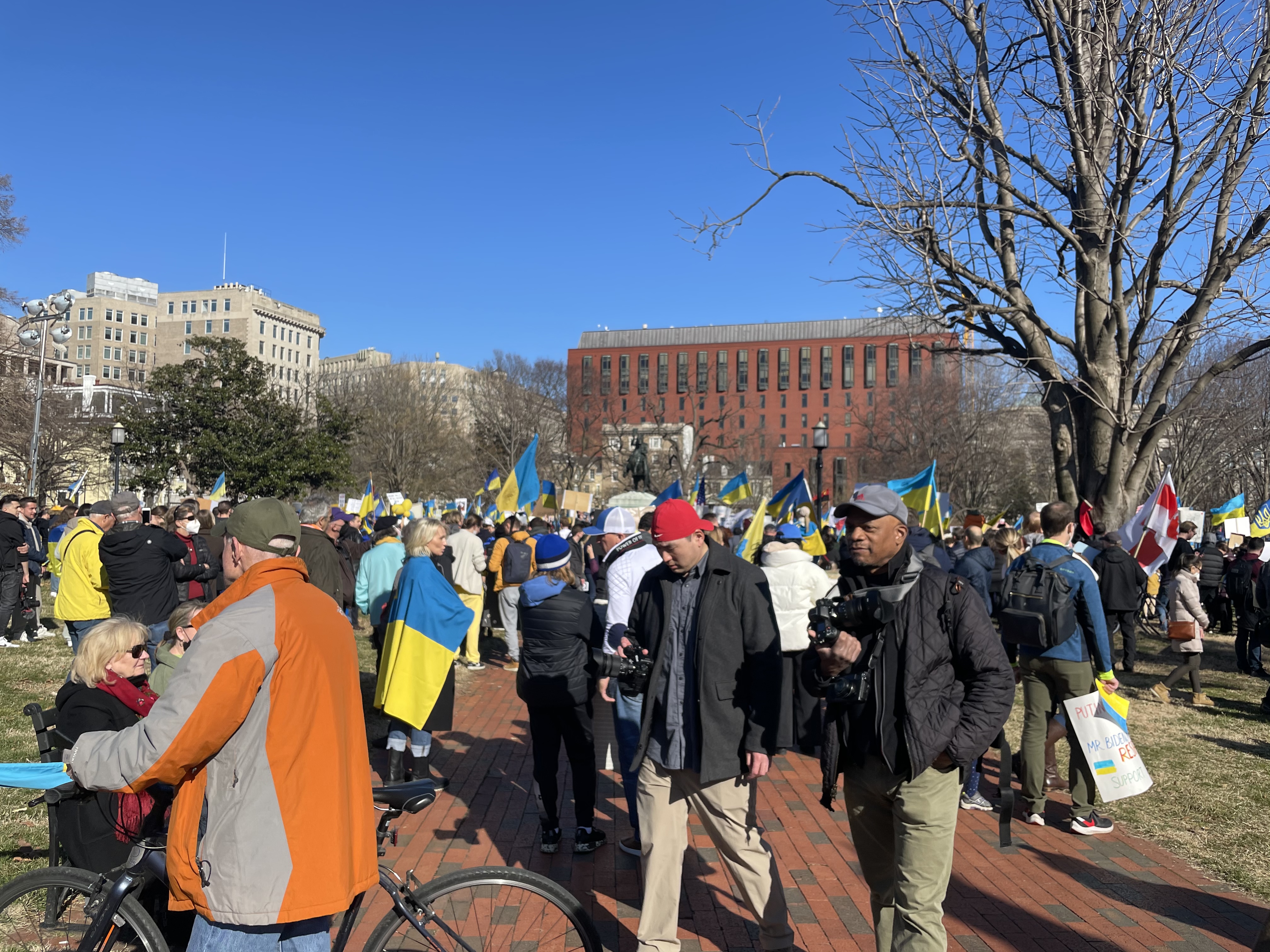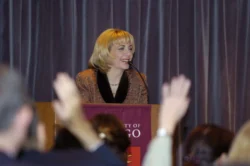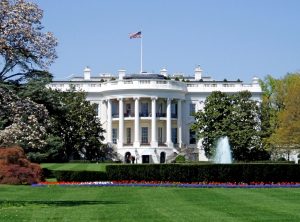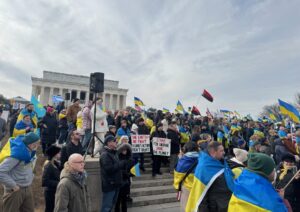When Inna Cherniak (SFS-Q ’23) created the “StandwithUkraineGU” group chat for students on Friday, Feb. 25, a day and a half after Vladimir Putin launched a full-scale invasion of her home country, Ukraine, she could not have imagined the scenes of protest and student mobilizations that would follow.
On Feb. 27, students using the group chat for coordination joined a sea of blue and gold in Lafayette Square made of thousands of protesters carrying Ukrainian, Georgian, and U.S. flags into the center of D.C. The ongoing Russian invasion of Ukraine proved eerily similar to its 2008 invasion of Georgia, renewing memories of Russian aggression for Eastern Europeans in the U.S.
“I heard and saw chanting and signs both in English and Ukrainian,” Emma Wong (SFS ’25) said. “It was a really moving experience to observe.”
Mothers wearing garlands of bluebells and sunflowers pulled wagons and pushed strollers with their children, some wrapped in Ukrainian flags. Protestors raised banners calling on the U.S. and its allies to ban Russia from SWIFT—a money order and transfer network that connects over 10,000 financial institutions, facilitating the expedient exchange of crucial economic information. A partial Russian ban from SWIFT has already been imposed, compounding the already crippling effects of sanctions on the Russian economy.
Others bore signs reading “Shelter for Ukrainian Sky,” referring to a Kyiv-requested no-fly zone to protect civilians under siege from the Russian air strikes that have increasingly targeted residential areas. Defense officials have rejected the idea of a no-fly zone, as it requires that NATO aircraft engage in direct combat with Russian planes that enter Ukrainian airspace to enforce it.
At around 3:00 p.m., a hush descended on the square as the Ukrainian national anthem played; protesters responded with applause and shouts of the official salute of the Ukrainian armed forces: Slava Ukraini, Heroyam Slava! “Glory to Ukraine, glory to the heroes!”
Organized by humanitarian aid organizations United Help Ukraine, Razom for Ukraine, and UNISdirect, the National Rally to Support Ukraine brought a number of prominent speakers, including John E. Herbst, former U.S. ambassador to Ukraine. Herbst called on the White House to engage in stronger statesmanship by sending humanitarian aid to Ukraine, puncturing the Russian information space, and preventing as much bloodshed as possible.
“This absolutely extraordinary example of Kremlin aggression has turned world opinion decidedly in favor of the victim, of Ukraine,” Herbst said.
The events in the center of the capital mirrored demonstrations on Georgetown’s campus.
The day after the initial invasion, the School of Foreign Service (SFS) held a town hall, with hundreds of students crowded into the ICC Galleria. Students heard Caitlin Talmadge, professor of security studies, and Charles Kupchan, professor of international affairs, discuss the implications of the largest ground war in Europe since the end of World War II.
Orest Mahlay (COL ’22), a Ukrainian-American who has family still in Kyiv, felt encouraged but not entirely satisfied by the community’s response.
“I think the Georgetown community has done a good job with calling all the students to pray for peace in the region, for the war to end,” Mahlay said, but added that the discussion has also lacked some historical scope. Mahlay pointed out that the current invasion of Ukraine, in reality, started with the Russian annexation of Crimea in 2014.
Sofia Sulek (SFS ’23), an international student from Slovakia, highlighted how student engagement in protesting the Russian invasion at Georgetown differs from in her home country. “I know that in Slovakia, everyone cares, everyone is trying to do their best, and everyone is very affected by this,” Sulek said. “Here, that isn’t the case, because of course not everyone is directly involved and there are so many issues in the world that one can devote themselves to.”
Sulek wished she was back in Slovakia, noting that support efforts for Ukraine from neighboring countries are far more straightforward. “I could literally just catch a train and go to the border and help Ukrainians directly instead of just handing out flyers halfway across the globe.”
According to Lawrence Trevette (SFS ’23), a Ukrainian-American who helped chalk Red Square on Feb. 28 with protest slogans, the war in Ukraine and subsequent activism in D.C. have contributed to a stronger sense of community among Ukrainian students on campus.
“Before Russia invaded, I didn’t actually know many other Ukranians here,” Trevette said. “I feel like it’s brought us all together. We’re speaking more Ukrainian, and just hanging out a lot more.”
Similarly, the conflict spurred Sulek to become more engaged with the Eastern European community on campus. “Before the war, I didn’t really feel connected to my Slavic identity on campus. When the war broke out, I wanted to go to protests with people who were Eastern European or Ukrainian,” Sulek said. “There’s a phrase I keep on repeating: If your neighbor’s house is on fire, you go grab a bucket and you help out.”
In an interview with the Voice, Prof. Michael David Fox, director of the Center for Eurasian, Russian and East European Studies and leading historian of modern Russia, offered suggestions on how the program and the SFS could support Ukrainian students. He referenced the #AfghanEvac program as a potential template—a program in which Georgetown students and faculty worked to coordinate evacuation flights out of Afghanistan.
Fox advocated for the university to facilitate the evacuation of Ukrainian students and scholars still stuck in the country.
“Whatever happens, there’s going to be a huge fallout from this and a huge refugee [and] humanitarian problem,” he said. “The SFS did a lot of work helping refugees from Afghanistan, and it was done very quickly and involved a lot of people working very hard around the clock.”
For students like Cherniak, the war in Ukraine is directly impacting loved ones still in the country. Cherniak’s parents and many of her relatives have yet to leave as of Feb. 28.
“Whenever I ask my parents, they always say ‘relatively we’re good’ because they keep receiving messages from their friends from different cities that are getting actively attacked,” Cherniak said. “Even though the city they’re in is getting actively attacked, there’s at least no fighting on the streets. They are trying to be optimistic, but I don’t think there’s any place in Ukraine right now that is safe.”
As Ukrainian resistance continues, the Kremlin has redoubled its efforts. Russia has been accused of committing war crimes by both the Ukrainian government and U.S. State Department. Recent attacks have targeted nuclear power plants and cut power to Chernobyl’s nuclear waste containment facilities, and weapons banned by the Geneva Convention—notably cluster and vacuum bombs—have been used against both Ukranian soldiers and civilians by Russian forces.
Russian breaches of ceasefire, as alleged by Kyiv, have also greatly complicated efforts by humanitarian organizations such as the Red Cross to evacuate the besieged city of Mariupol. Civilians, including children, have paid the price: Russian troops bombed a maternity ward last week, an act condemned by both the United Nations and the Ukrainian government.
The UN Human Rights Council has verified more than 1,900 civilian casualties as of March 16, with actual figures believed to be significantly higher.
Meanwhile, the Russian government has ramped up its disinformation campaign, not only through domestic crackdowns on journalists facing 15-year prison sentences for using the vocabulary “war” or “invasion,” but also by inundating foreign audiences with out-of-context war coverage, video, photos, and justifications of the invasion through Russian-owned outlets and social media accounts.
The disinformation can jeopardize efforts to support the Ukrainian cause, according to Cherniak.
“Russia is conducting this war on two fronts, one of them being information,” Cherniak said. “Stay with sources that are trustworthy and share information so that people don’t forget about this. It’s very easy to grow desensitized to conflicts. We shouldn’t forget or disregard the war crimes happening in Ukraine right now.”
Fox noted that the Kremlin is pushing its own narrative to justify the invasion. “There are many manipulations and distortions of history going on to justify this invasion,” Fox said, “But regardless of history and the manipulation of history or ideology, this is an attack on a sovereign country.”
In light of the rapid response from university administrators condemning Russia’s actions, some members of the student body have raised concerns about the inconsistency of university responses to international conflicts, especially when victims are non-white. The university has shown support for Ukraine, with President John J. DeGioia releasing a statement of solidarity on March 7 and various university programs issuing similar assertions. Yet Israeli airstrikes on Palestine last May and the onset of the Ethiopian civil war in November 2020, a conflict that has resulted in nearly 10,000 deaths, elicited no comparable response.
“Our society does pay a lot more attention to wars and conflicts that happen in Europe, or just looking at everything through a Eurocentric lens,” Sulek said. “It would be great if a lot of other places and war zones also got this much attention.”
The StandwithUkraineGU movement also expressed discontent with the overly academic mode of the SFS’s town hall discussion and decided to do more.
“We wanted to center Ukranian voices because it’s taking attention away from the people who are putting their lives on the line every day,” Sulek, who attended a United Help Ukraine protest at the White House instead of the town hall, said. “We wanted to create an event that would make it clear that this is what the conflict, the war, is about.”
Students in the movement began tabling in Red Square on Feb. 28, with their efforts culminating in a rally on the steps of Healy Hall the night of March 3. The building’s right atrium glowed blue and gold over the hundred students and faculty in attendance.
Prof. Maryna Baydyuk, an assistant research professor and the president of United Help Ukraine, spoke at the event to emphasize the organization’s efforts to flag the Russian military buildup before the invasion. United Help Ukraine, headed by Baydyuk, is a D.C.-based organization focused on humanitarian aid and raising awareness. She also addressed the realities of sending much-needed aid to her home country.
“I was telling my students in neurobiology class two weeks ago that there will be a day when I come to class and I’ll be in tears because my country is being attacked,” Baydyuk said. “That day has come. On Wednesday night, they started bombing our cities. I had to call my mom, my dad, and my sister and tell them, ‘Seek shelter now, they’re bombing.’ They couldn’t believe it.”
During the rally, several student speakers, including Cherniak and Sulek, advocated for greater awareness of the conflict and support from the student body.
“Donations matter a lot right now too. I know some people might not be comfortable donating to the army, but there are so many humanitarian aspects that Ukranians need right now,” Cherniak said. “Also, if you’re American, you can reach out to your representatives.” For one, the UN has highlighted efforts to protect women and girls from gender-based violence as they flee the country and support for health services in Ukraine straining due to civilian casualties as especially important.
A vast array of organizations currently run programs to aid Ukrainian civilians and volunteers under siege. Razom for Ukraine, Sunflower of Peace, Voices of Children, and the Kyiv Independent, a new online organization doing English language reporting in Ukraine, have also gained recent prominence for their work in the ongoing conflict. International organizations such as UNICEF, Doctors without Borders, the International Committee of the Red Cross, the UN Refugee Agency, and the International Medical Corps are all partnering with local efforts in Ukraine and requesting donations.
“It’s really heartbreaking to hear stories from volunteers in Ukraine saying ‘we need help, we need medical supplies, we’re running out—there are too many wounded.’ There’s no way to send supplies immediately, but we’re working on it,” Baydyuk added.
As students settle back into campus after spring break, Mahlay requests that the student body stays engaged with the war and continues to support Ukrainians.
“One request I would have in the next week, months, is making sure that we have fruitful conversations that center Ukrainians,” Mahlay said. “I do feel a huge level of support from the student body, especially in the last week. There’s been such an outpouring of love, asking how we’re doing, how our families are doing. This is really important for us Ukrainian students right now.”
Editor’s Note: This article was edited to reflect that professor Charles Kupchan spoke at the Georgetown Ukraine rally, not Charles King.







